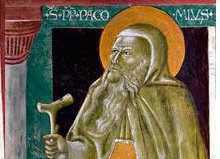PACHOMIUS (III-IV century)
Saint Pachomius is generally considered the founder of cenobitic monasticism. He was born in 287 CE in Esna, Egypt, from a pagan family and, at the age of twenty years old, he was forced to join the roman imperial army, at that time committed to a military campaign in the eastern provinces; imprisoned in 312, he was comforted and fed by Christians.
Profoundly moved by the noble action, Pachomius converted to Christianity and, after being set free, he started conducting a different kind of lifestyle by following an educational and spiritual path that led firstly to his baptism and then to the decision to dedicate himself entirely to monastic life.
Later on, he became a disciple of the hermit Palaemon and followed his steps for a few years. When he withdrew in solitude in the Tebaid desert, he took part in the heremitical community of Anthony the Great, founder of hermitism.
Between the 318 and the 320, Pachomius decided to found the first cenobitic monastery as he wanted to follow Jesus’s lifestyle that- as the Gospels attest- had lived with his disciples. The small community of monks found by Pachomius got so rapidly wider that it required a Monastic Rule to discipline cenobites' lives.
This “Rule” - called “Angel’s rule” because of the legend that Pachomius might have received it from an angel- was based on three fundamental principles: prayer, discipline and work.
At Pachomius’s death, in 346, cenobitic monasticism spread in Egypt, Palestine, Syria, North Africa and southern Europe.

